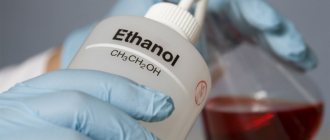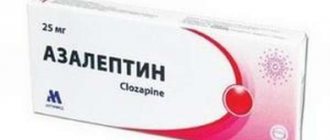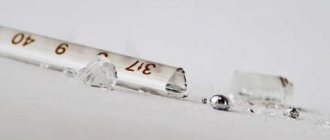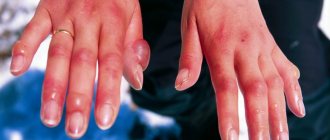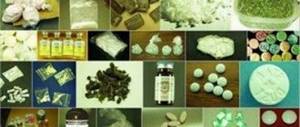Methyl alcohol is an explosive substance used in the pharmaceutical and chemical industries. Most often it can be found in the list of components in the production of antifreeze and solvents, as liquid fuel, including for municipal purposes, and as an additive to gasoline.
The topic of the effect of methanol on the human body deserves special attention. For people, this is a rather dangerous substance that acts no worse than poison - it affects the nervous and vascular system, at best leading to disability, and at worst to death. How to protect yourself from ethanol? What symptoms indicate poisoning of the body? Is there an antidote? We have prepared an article in which we will answer in detail all questions related to the effect of this poison on the human body.
Isopropyl alcohol vapor poisoning
Isopropanol is a moderately hazardous substance for human health.
It is used in the production of acetone and hydrogen peroxide. As an analogue of ethanol, it is found in cosmetic products and household substances. They can also use it in making perfumes. Isopropyl alcohol 70% has disinfectant properties. In the household sphere, this alcohol is found in various detergents. It is also an excellent solvent. It tends to evaporate quickly in the open air. In enclosed spaces, vapors should not exceed the norm of 10 mg per 1 m³. Exceeding the norm poses a threat to human health.
Alcohol poisoning occurs when vapors are inhaled. The mucous membranes of the eyes and respiratory organs are primarily damaged. Toxic substances cause severe headaches and depression of the central nervous system.
In rare cases, this alcohol is used as a narcotic or intoxicant. The consequences can be of varying complexity.
Once in the stomach, alcohol is easily absorbed. Toxins are removed from the body through urination and exhaled air. After a person has suffered from isopropyl alcohol poisoning, they may encounter the following problems:
- Gastritis.
- Diarrhea.
- High blood pressure.
- Tachycardia.
- Kidney failure.
The lethal dose of isopropanol for humans is 250 ml. A small amount of this alcohol has a serious effect on human health. The feeling of intoxication is much stronger than from ethanol. Therefore, a person becomes heavily intoxicated much earlier and is not able to take a lethal dose.
When working with isopropanol, it is recommended to wear a protective mask and ventilate the room. This alcohol has increased volatility. Inhalation of its vapors irritates the mucous membrane of the respiratory system and eyes. In addition, isopropyl alcohol sharply depresses the central nervous system. Intoxication is accompanied by the following symptoms:
- headache;
- nausea;
- pain in the eyes;
- cough;
- pain when swallowing;
- lethargy, weakness or feeling drunk.
Why is isopropanol harmful to human health?
Once in the body, regardless of the method, isopropanol has a triple effect: intoxicating, like alcohol, toxic, narcotic. Intoxication occurs faster and stronger than when drinking alcohol: 10 ml of the substance drunk is equivalent to 100 ml of pure ethanol.
If the amount drunk reaches 40-50 ml in an adult , a health hazard arises , and a dose of about 300 ml can be fatal. For children, this amount is two to three times less, depending on age.
Intoxication develops as follows. Once in the bloodstream into the liver, isopropanol is decomposed by the liver cell enzyme alcohol dehydrogenase, turning into acetone. It has a toxic effect on the liver, kidneys, cardiovascular and nervous systems, as well as an intoxicating effect.
The narcotic effect of isopropanol is 2 times stronger than ethyl; it sharply depresses the central nervous system, inhibiting the sensitive, motor spheres, leads to a state of stupor, coma, and in large doses can cause death.
You can also be poisoned by the vapors of the substance. This can happen if the substance was spilled inside a closed room, and the person inhaled the vapors of the toxic substance for a long time. Isopropanol vapors cause damage to the eyes and respiratory tract.
Description of the substance
Before answering the question of whether people drink isopropyl alcohol, let’s consider the composition of this chemical compound.
Isopropanol appears as a clear, colorless liquid. It has a stronger odor than ethanol. The formula of isopropyl alcohol is C3H8O. This substance belongs to aliphatic compounds that do not contain a benzene ring. From a chemical point of view, isopropanol is the simplest monohydric alcohol.
The oxygen and hydrogen in this compound form a single hydroxyl group (OH) bonded to a carbon atom.
- carbon;
- hydrogen;
- oxygen.
When used internally, isopropanol has a harmful effect on almost all organs and systems.
In the first hours, the gastrointestinal tract takes the blow, its mucous membrane is irritated - swelling, burn areas and even defects occur. Moving through the intestines, isopropanol inactivates digestive enzymes and inhibits beneficial microflora.
Absorbed into the blood, it enters the liver through the portal vein and increases the load on the liver cells, which neutralize it. Toxic hepatitis and liver failure may develop. 20% of unchanged alcohol enters the kidneys, affecting the renal tubules. In addition, acetone, absorbed into the blood from the liver, is also ultimately excreted by the kidneys, having a toxic effect on them.
First aid to the victim
If a person has been poisoned by isopropanol vapor or consumed alcohol internally, it is necessary to call an ambulance. Treatment of intoxication is carried out in a hospital setting.
Before the doctors arrive, it is necessary to provide the patient with first aid:
- You need to rinse your stomach with a solution of baking soda. The person is given a large amount of liquid to drink and then vomited. This will help remove the remaining poison from the gastrointestinal tract.
- The patient should be given enterosorbents: “Smecta”, “Polysorb”, “Activated carbon”, “Enterosgel”.
- If the patient vomits, he should be placed on his side. This will prevent you from inhaling the vomit.
- You need to unbutton the collar and free the person from tight clothing. This will help make breathing easier.
- If the patient is poisoned by alcohol vapor, then the windows need to be opened so that fresh air can enter the room.
When poisoning occurs, the victim himself can tell the cause. This is very important, since it is necessary to properly provide assistance to the victim before the ambulance arrives in order to avoid severe ones.
- First of all, immediately call an ambulance and tell the doctors the cause of the poisoning.
- Prepare a low concentration soda solution and give it to the victim to drink in small quantities. It causes a gag reflex. This is necessary to remove as many toxins from the body as possible.
- Give the victim a laxative to stimulate intestinal motility. This will help remove toxins to a strong effect on the organs of the digestive system.
Such assistance is relevant when the victim is conscious. If the victim is unconscious, he should be placed on his stomach. In this case, the head should be turned to the side to avoid vomit getting into the respiratory tract. In this situation, you should wait for the doctors to arrive.
- You need to rinse your stomach with a solution of baking soda. The person is given a large amount of liquid to drink and then vomited. This will help remove the remaining poison from the gastrointestinal tract.
- The patient should be given enterosorbents: “Smecta”, “Polysorb”, “Activated carbon”, “Enterosgel”.
- If the patient vomits, he should be placed on his side. This will prevent you from inhaling the vomit.
- You need to unbutton the collar and free the person from tight clothing. This will help make breathing easier.
- If the patient is poisoned by alcohol vapor, then the windows need to be opened so that fresh air can enter the room.
First aid to the victim consists of the following measures:
- It is necessary to induce vomiting;
- flush the stomach using the “restaurant” method;
- give a glass of vodka or diluted alcohol to drink (in this case it is not harmful, but useful, since it is an antidote to isopropyl alcohol);
- Call an ambulance and hospitalize the victim in the intensive care unit.
How to help a sick person at home
Do-it-yourself pre-medical care at home:
- If a person is unconscious, you need to put him to bed, raise his head and turn it to the side so that vomit does not enter the respiratory system;
- Flush the stomach of a conscious patient. Give 10-15 crushed tablets of activated carbon, calculating the dose: 1 tablet per 10 kg of person’s weight;
- If the product gets into the eyes, thoroughly rinsing the organ under running clean water helps reduce harm. If measures to neutralize the effects are not taken in a timely manner, loss of vision is possible;
- If a burning sensation is felt in the respiratory tract while working with a toxic substance, it is necessary to urgently take the person out into fresh air and ventilate the room. It is recommended to rinse the mucous membranes with cool water;
- If the discomfort does not go away after the measures taken, you should seek help from a medical institution.
In the hospital, the body is washed with hemodialysis by connecting an “artificial kidney” machine. The measure is taken if the person’s condition is extremely serious. Then the diagnosis is clarified by taking the necessary tests, and appropriate treatment is carried out. Special medical nutrition is prescribed for a certain period.
Consuming technical liquids internally is dangerous to health.
Systematic drinking of isopropyl alcohol causes significant harm to the human body:
- The stomach is affected by gastritis of various etiologies, which becomes chronic. Regular burns of the mucous membrane lead to ulceration of the surface, the formation of ulcers and erosions;
- The liver, burdened with the withdrawal of the drug, is poisoned by derivatives of acetone processing. Its cells die and during constant intoxication they do not have time to recover;
- The genitourinary system suffers from acetone exposure, significant damage is caused to the kidneys;
- The heart cannot withstand the increased load of the toxic substance, resulting in life-threatening pathologies;
- The brain, washed with blood containing acetone, suffers. The possibility of irreversible damage increases;
- Hormonal metabolism is disrupted, causing a malfunction of the pancreas and thyroid gland. Increased or, conversely, decreased production of hormones leads to disruption of the entire human body.
Drinking drinks not intended for drinking leads to a malfunction in the coordinated functioning of human internal organs. Toxic substances lead to irreversible changes in the human body, causing severe illnesses, malignant neoplasms, and often death.
It's no secret that vodka is a classic representative of alcoholic beverages, and its consumption, even in limited doses, significantly harms the health of men and women. It contains ethyl alcohol, which destroys not only the liver and stomach, but also affects nerve cells with subsequent exacerbation of pathologies of the central nervous system and brain. The harm of vodka is obvious, but some doctors insist that this drink is useful to drink in small quantities to maintain the health of the body. What healing properties are there?
Properties
Isopropanol has a low density but is less volatile than ethanol. A high concentration of its vapors can cause intoxication. At a temperature of 80 degrees, alcohol boils. When mixed with air, this compound is flammable and can explode. If you heat alcohol to a temperature of 450 degrees, the liquid can spontaneously ignite.
Isopropyl alcohol oxidizes easily, turning into acetone. It is a powerful solvent and mixes well with water. Exposure to ethanol can damage rubber products. Essential oils and resins are completely dissolved in this alcohol.
Isopropanol is very similar in properties and smell to ethanol. This similarity provokes some alcohol lovers to ingest this liquid with the smell of alcohol. However, when asked whether it is possible to drink isopropyl alcohol, doctors give a clear negative answer. Even vapors of this substance in high concentrations can cause poisoning, not to mention ingestion of alcohol.
There are times when a person drinks unfamiliar alcohol by mistake. However, it is very easy to distinguish this compound from strong drinks. The alcoholic odor of isopropanol is much stronger than that of ethanol.
Treatment
Many types of alcohol are used in medical practice, but isopropyl is an exception, since it is used for other purposes. Thus, some similarity with all known ethanol provokes the incorrect use of isopropyl alcohol, which leads to intoxication.
What kind of substance is this, and for what purposes can it be used, why can intoxication with isopropyl alcohol occur, and what are the symptoms of this? What to do for a poisoned person and eliminate the negative impact that has arisen during intoxication, we will figure out further.
Isopropyl alcohol (IPA) is popularly called by different names, among the most common names are:
- Isopropanol;
- Second-propanol;
- Dimethylcarbinol;
These names are not uncommon in everyday life, but it is worth understanding that this chemical is nothing more than isopropyl alcohol.
We invite you to read: About the dangers of alcoholism. Useful information for schoolchildren and teenagers
Properties
- It burns out instantly, during which there is no smoke or soot. Breaks down into water and carbon dioxide;
- Compared to similar methanol, this chemical compound is less toxic, therefore it is popular in use by cosmetologists and can be present in medications;
- Alcohol perfectly dissolves essential oils and many resins;
- Easily combines with water, and, depending on the ratio of the components, the freezing point of this mixture is determined;
- Through simple chemical reactions it can be converted into acetone;
- Has a sharp, distinctive odor;
- Outwardly it looks like an ordinary liquid;
- When mixed with oxygen, it can become explosive.
When it enters the human body, it causes a state of intoxication, but due to its toxicity, the intoxicating effect is much higher than when consuming ethanol, which becomes a decisive factor for those who want to “get drunk.”
Methyl alcohol poisoning
This chemical compound is obtained industrially in several ways. In most cases it is used for the manufacture of household chemicals.
- When adding hydrogen and various accelerators to acetone to speed up the production of the chemical.
- Hydration of propylene, which is first mixed with sulfuric acid, and then exposed to water at high temperature, obtaining the final substance - isopropyl alcohol.
- Paraffin oxidation is less effective;
Due to the fact that isopropanol is part of the alcohol group, it has both beneficial and negative properties.
It is worth understanding when and why a person can be poisoned by this chemical. Considering that ICP, in its pure form or as part of a variety of household substances, is used both in industry and in everyday life, it is available for use for various purposes by almost everyone.
If this alcohol is burned indoors, a person may become poisoned. During the combustion process, it decomposes into water and carbon dioxide, which is dangerous for the human body in excess. IPS combustion temperature is 82.5 C.
IMPORTANT!!! It is strictly forbidden to take this substance internally, since it is equivalent to self-poisoning, even if it is slow. This is explained by the fact that when alcohol enters the body, it is processed by the liver, which, when breaking down IPA, converts it into acetone.
Consequences of overdose (poisoning) with Phenozepam and treatment
Isopropanol is a more toxic substance, unlike ethanol. Thus, the intoxicating effect of drinking it comes much faster and more powerful, which leads to addiction.
If you consume at least 50 ml of such alcohol in its pure form, undeniable poisoning of the body will occur. The child's body will negatively perceive an even smaller dose.
According to statistics, IPA poisoning occurs in children under 6 years of age.
This chemical compound decomposes in the human body from 3 to 8 hours. This time is enough to have an adverse effect on the entire body as a whole.
It is an undeniable fact that IPA is a toxic substance that is fatal to health. In medical practice, it is used only for the manufacture of external medications, but in no case for internal use.
In an enclosed space, IPA vapors have an adverse effect, but in an open space they are harmless. If proper storage and transportation conditions are observed, it is not dangerous in industrial and household substances.
Symptoms of intoxication with this alcohol are as follows:
- Initially, signs of typical alcohol poisoning appear: disturbances in speech, gait, movements, and consciousness;
- Severe fatigue may set in and the person will fall asleep;
- If there is an excess of it in the body, severe headache, dizziness, and continuous vomiting occur;
- Pain in the body, muscles, abdomen, chest, heart;
- Visual impairment;
- Impaired functioning of the respiratory tract up to the establishment of breathing;
- If more than 12 ppm of IPA is consumed internally, it can lead to serious consequences, including death, since it burns the body from the inside;
Thus, it can be argued that drinking this alcohol is prohibited! Even when taking a minimal amount, this substance can lead to general weakness, nausea, headache, and vomiting. In most cases, it is not taken internally, so there are not many cases of death.
Removing alcohol toxins from the body
As for the degree of danger, IPA is classified as class three, but despite its relative safety, severe consequences may follow depending on the volume of alcohol ingested into the body.
There is no antidote for IPA intoxication, so treatment is more difficult than for ordinary alcohol poisoning.
Flushing the stomach of a person who has been poisoned with plenty of water;
Call doctors, since this poisoning cannot be treated independently without the intervention of doctors.
In case of acute poisoning with this substance, the consequences can be disastrous not only during the poisoning itself, but also after it, because:
- The functioning of organs such as the liver, kidneys, and heart is disrupted;
- Digestive tract failure;
- Possible disturbances in the functioning of the central nervous system.
Important!!! Like all chemical compounds, IPA is dangerous to human health and life. When used correctly, it does no harm and does not lead to tragic consequences.
Is there an antidote to alcohol or how to sober up quickly
In case of alcohol poisoning with isopropanol, the victim is hospitalized. First aid consists of gastric lavage. This is necessary to eliminate any remaining alcohol. Treatment of such poisoning is carried out strictly in a hospital.
After all the examinations and test results, the doctor makes a diagnosis. Only after this is treatment prescribed. Most drug treatment focuses on removing isopropyl alcohol and acetone from the blood. If the amount of toxins is very large and the patient is in a comatose state, doctors use hemodialysis.
In mild cases, the victim is given rehabilitation and supportive therapy. The stomach is washed and acetone is removed from the lungs. Such manipulations are carried out in case of alcohol vapor poisoning.
Sodium bicarbonate helps restore acid balance in the body after poisoning. With the help of glucose and a vitamin complex, the body is restored. After treatment, the patient will still have a period of rehabilitation. To do this, the doctor prescribes medications to prevent the development of pathologies due to poisoning.
You should not ingest any alcohol out of curiosity or other reasons. Compliance with the rules and regulations for the use of isopropyl alcohol will be the best guarantee of health safety. In cases of poisoning, you should immediately call an ambulance and do not self-medicate.
In hospital treatment, symptomatic therapy is prescribed:
- The patient is injected with saline and plasma-like components in large quantities.
- Intravenous drip administration of vitamins is used.
- If necessary, hormonal agents are prescribed (for example, Prednisolone).
- Measures are being taken to correct the acid-base balance.
The patient’s health condition is stabilized at the prehospital stage, that is, when he is admitted to the intensive care unit. To carry out resuscitation measures, a central vein is catheterized and the patient’s mouth and nose are cleaned (to ensure normal breathing). If the poisoned suffer from acute respiratory distress, they are connected to a ventilator.
The poison can be removed by gastric lavage. To do this, a thick gastric tube is inserted. If the patient drank alcohol more than three hours ago, then rinsing is useless. If it is necessary to isolate the absorbed poison, then the following procedures are used:
- Dialysis.
- Forced diuresis.
- Enterosorption.
- Flushing the gastrointestinal tract.
Ethyl alcohol is used as a specific antidote. Drinking it internally in case of poisoning is strictly prohibited! Ethanol is introduced into the body intravenously (0.5 liters of a 10 percent solution in glucose is used - 5 or 10 percent). If the patient does not tolerate glucose, then an isotonic sodium chloride solution can be used.
With timely initiation of therapy, recovery occurs.
Isopropyl alcohol, also known as isopropanol, belongs to the category of polyhydric alcohols and is a colorless volatile liquid that has the taste of ethyl alcohol and an odor vaguely reminiscent of acetone. Isopropanol is used as a substitute for the more expensive ethyl alcohol in the production of substances such as:
- car “anti-freeze” for cleaning windows in winter;
- paint solvent;
- antifreeze or antifreeze
- degreasers;
- varnish;
- detergents;
- cements;
- automobile fuel.
We suggest you read: Breakdown of alcohol in the body: increasing the rate of ethanol removal
Some car enthusiasts add isopropyl alcohol to motor gasoline to get rid of water that accumulates at the bottom of the gas tank.
Treatment of acute poisoning with alcohol surrogates and toxic alcohols is carried out in the following areas:
- stabilization of condition;
- removal of poison;
- antidote therapy;
- symptomatic therapy.
Useful information
Despite the fact that vodka has beneficial properties, there are strict age restrictions for its consumption. Ethyl alcohol is strictly contraindicated for children, with the exception of alcohol tinctures individually prescribed by the attending physician.
Qualified experts reasonably recommend replacing 25 ml of vodka with a glass of red wine, which has much more beneficial properties. The permissible dose of a red drink is 100-150 ml, but no more.
The beneficial properties of vodka once again confirm the high effectiveness of alcohol tinctures, which doctors prescribe in the treatment of a particular disease. Some alcoholics buy such medications to achieve a state of alcoholic intoxication, but such experiments are dangerous to human life.
If you have a genetic predisposition, it is strictly forbidden to drink vodka, since even small doses of alcohol can develop psychological and emotional dependence. Such people are at risk, so even taking alcohol tinctures for treatment and prevention is extremely undesirable.
If a person drinks the permissible dose of vodka, he must have a snack, otherwise the feeling of alcoholic intoxication will become the norm of everyday life. It is best not to delay such preventive measures, otherwise you can turn into a dependent person. Otherwise, a lecture on the dangers of ethyl alcohol will also not be superfluous to anyone.
Ethanol is a dangerous liquid for the human body. Ethyl alcohol poisoning is dangerous, and the consequences of regular use can be fatal. What is important to know about this deadly liquid to protect your health?
According to GOST dated 1993, ethyl alcohol is a flammable liquid with a slight odor and no color. This is the point in the description. However, if you look up the papers for 1972, you can read that this is a potent drug that, with constant use, provokes central nervous system paralysis. And this is worth thinking about.
Produced during the fermentation of organic products (most often rye, wheat, potatoes). By diluting with water and flavorings, you can get a cocktail or any other alcoholic liquid.
Depending on the purity of the resulting product, it is divided into several categories:
- The first grade is not used for making alcohol.
- The highest degree of purification - this alcohol is used by manufacturers of cheap and counterfeit wine and vodka products.
- Basis - used for the production of alcohol in the middle price segment.
- Extra - the difference lies in the lower content of heavy esters. However, it is also used in alcohol, which is available to everyone.
- Lux – goes through several stages of purification and is used in premium vodka production.
- Alpha - made only from grain crops. This alcohol is featured in super-premium vodka formulations.
Important! Despite the category of ethanol included in alcohol products, it is in any case dangerous. The most purified version does not guarantee harmlessness to the body.
Production and sales
The starting material for the production of isopropyl is propylene. Alcohol is produced by a hydration reaction in two ways:
- Direct hydration method. Highly purified propylene is used for the reaction. It is combined with water under pressure. Catalysts are used to speed up the process. As a result of hydration, absolute isopropyl alcohol is obtained. This is a high-quality product with a purification degree of more than 90%.
- Indirect hydration. This method produces technical isopropyl alcohol. It has a lower degree of purification than the absolute product. Propylene and sulfuric acid are used for the reaction. As a result of the interaction of these ingredients, not only alcohol is formed, but also various esters.
How many degrees is isopropyl alcohol? Absolute isopropanol can be found on sale. Its strength is 99.7%. This substance is used only as a solvent or cleaner and is not intended for ingestion. The price of isopropyl alcohol ranges from 150 to 300 rubles per 1 liter.
There is also a product on sale that is intended for cleaning office equipment. This substance is subjected to more thorough processing, all harmful impurities are removed from it. This compound is produced under the name “Professional or rectified isopropyl alcohol.” Its price is much higher - from 700 to 1100 rubles for 0.5 - 1 liter.
There is also a product on sale that is intended for cleaning office equipment. This substance is subjected to more thorough processing, all harmful impurities are removed from it. This compound is produced under the name “Professional or rectified isopropyl alcohol.” Its price is much higher - from 700 to 1100 rubles for 0.5 - 1 liter.
Industrial use
As already mentioned, this alcohol is widely used in various industries. Isopropanol is used in the production of the following types of products:
- perfumery and cosmetic products;
- acetone;
- paints and varnishes;
- external medicines;
- antifreeze;
- resins;
- electronic parts (for cleaning);
- aviation gasoline;
- printed products (for humidification).
It is important to note that the use of isopropyl alcohol in the food industry is not allowed. This compound is of low toxicity, but can still cause intoxication. It was assigned hazard class 3. This means that the substance is moderately toxic. Therefore, such alcohol cannot be used in food production.
Forecasts
Isopropyl alcohol can cause severe poisoning only if the patient has drunk a large amount of the containing liquid. A successful outcome will depend on the speed and correctness of medical care, the characteristics of the victim’s body, as well as on the substances that the patient took in parallel with the use of the toxicant.
In most cases, patients with mild to moderate poisoning survive and return to normal life within 2-4 weeks after poisoning. Severe pathology often ends in death, even with the necessary resuscitation aid.
To summarize, drinking isopropyl alcohol is strictly prohibited. Despite its similar name and effect to ethanol, it cannot be used for food purposes. Its hazard class requires avoiding contact of the substance not only with the mouth, but also with the skin.
Medical use
Only topical use of isopropyl alcohol in medical practice is allowed. This compound has disinfectant properties. It is used for the following purposes:
- for treating the skin before injection;
- for application to a cotton swab (for the treatment of otitis externa);
- as an impregnation for medical wipes.
Thus, we see that in medicine this substance is used only as an external agent. Its use for internal reception is not intended.
Is it possible to drink highly purified isopropyl alcohol? This question is sometimes asked by people who are addicted to alcohol. Doctors give a negative answer. Even very high-quality and purified isopropanol is extremely toxic to humans. The danger of this substance lies not in the presence of impurities, but in the negative effects of alcohol on the body.
The benefits of vodka
If you ask any person whether vodka is beneficial or not; The first thing that comes to mind is the disinfecting properties of this alcoholic drink. Indeed, such an action is beneficial for the body, since the local antiseptic has more than once saved wounds from infection and suppuration, relieved inflammation and disinfected even deep wounds in the absence of other medications at hand. Even today, vodka is used for disinfection, even in childhood.
Vodka is used as an effective antipyretic and analgesic. In the first case, we are talking about local use as a wrap against fever at any age. In the second, alcohol is drunk during acute attacks of pain to suppress extremely unpleasant sensations and moral suffering. In addition, in this accessible way you can easily thin the blood, which is especially important in cold climates.
The question immediately arises as to what other benefits vodka has for human health. It is worth recalling that this alcoholic drink contains ethyl alcohol, which is necessary for the preparation of many medicinal tinctures for various diseases. Of course, there are contraindications to taking such medications, but use strictly as prescribed by the attending physician ensures positive dynamics of the progressive disease. However, this does not mean that you are allowed to drink vodka regularly.
When studying the beneficial properties of vodka, it is worth focusing on the fact that a daily dose of 25 ml is considered therapeutic and preventive. This volume is quite enough to:
- provide effective prevention of atherosclerosis;
- accelerate systemic blood flow;
- stimulate metabolism;
- improve appetite;
- stabilize the sleep phase;
- eliminate nervous tension;
- suppress stress;
- increase energy resource;
- improve mood;
- reduce the threshold of pain sensitivity.
Many alcoholics, knowing these beneficial properties of vodka, try to systematically abuse alcoholic beverages. Such actions are dangerous to human life and health: if you drink, you can suddenly die from incurable diseases provoked by the increased activity of ethanol.
But still, the question of whether vodka is harmful has a lot of contradictions in extensive drug treatment practice.
Danger
When isopropyl alcohol enters the body, about 15% of this substance is converted into acetone. It is this connection that poses the main danger. It leads to severe intoxication with damage to many organs.
In addition, isopropanol depresses the central nervous system much more strongly than ethanol. It causes severe intoxication more quickly. 10 mg of isopropyl alcohol is equal in effect on the body to 100 g of ethanol. In order to get severe intoxication, it is enough to take a small amount of this compound.
This is why doctors answer the question negatively: “Can I drink isopropyl alcohol?” Even a small dose of such a substance can become a potent poison for the body. In many cases, intoxication can develop even when inhaling alcohol vapor.
This is why doctors answer the question negatively: “Can I drink isopropyl alcohol?” Even a small dose of such a substance can become a potent poison for the body. In many cases, intoxication can develop even when inhaling alcohol vapor.
Isopropyl alcohol is one of the simplest monohydric alcohols. It belongs to the aliphatic series, that is, it has no aromatic bonds. At the same time, the smell of the substance is pungent. Looks like ethanol.
It is used as a substitute in various areas of life: cosmetics, household chemicals, perfumes.
Its use as a hand disinfectant is very popular, as it provides better disinfection compared to ethyl alcohol.
Isopropanol is also used in medicine in the treatment of otitis externa and dermatitis. In the latter case, treatment is carried out by rubbing the affected areas of the skin. There is almost no harmful effect.
It requires great care when handling as it is flammable and toxic. It is regulated by GOST 9805–84, which describes different types of this alcohol: absolute and technical.
Instructions for their use are accordingly different.
It is often confused with isooctyl alcohol, but these are two different substances. Isopropyl is a lower alcohol. Structurally, it is closest to ethanol. A common misnomer is propylene alcohol.
Isopropanol is often confused with isopropyl chloride, which is formed from propylene and hydrogen chloride.
Properties of matter
Isopropyl, the formula of which looks like this - C3H8O, has the following properties:
- Forms ethers and esters.
- The hydroxyl group can be displaced by halogens.
- During dehydrogenation it turns into acetone.
- Reacts with strong oxidizing agents.
- Many chemical compounds dissolve well in isopropylene. Thanks to this property, it can be used as a substitute for ethanol in perfumery. It is even capable of dissolving some types of plastics and rubber.
- The smell is more pungent than ethanol.
- The freezing point of isopropyl alcohol is -89 degrees.
- Density - 786 kg/m³.
- Boiling point - 82.6 degrees.
- Molar mass - 60.1 g/mol.
- Flash point - 12 degrees.
Isopropanol can be obtained in several ways - by hydrogenation of acetone and hydration of propylene. The last method is the most common in Russia.
During production, fractions with a percentage of propylene from 30% to 90% can also be used, but now pure propylene is used much more often, since isopropanol can be synthesized this way even at low pressure.
This reduces the production of polymers and acetone, which are not needed at all.
You can also get propanol-2 from isopropyl ethanoate, isopropylamine, isopropyl bromide.
To get propane 2 ol, you need to go through two steps:
- At the first stage of production, a sulfuric acid extract is formed, the composition of which is isopropanol, isopropyl sulfate, sulfuric acid and water.
- The second stage is the evaporation of the resulting isopropyl alcohol.
Hydration of propylene is carried out using a catalyst, which is orthophosphoric acid. If isopropyl is produced by hydrogenation of acetone, a solid copper-nickel chromite catalyst is used.
Isopropylene can also be made by other methods, for example, by oxidizing alkanes with air.
Isopropyl alcohol is used to produce a huge number of chemicals: acetone, hydrogen peroxide, in the production of cosmetics, household chemicals, and disinfectants. Considering that ethanol is particularly intensively regulated by law, its use is to some extent unprofitable, while isopropanol is a complete substitute.
We suggest you familiarize yourself with: Ethyl alcohol for internal use
Areas of use
This substance costs very little, so it is in demand in many industrial areas. These include:
Production of paint and varnish materials. Used in the form of varnishes and solvents based on cellulose nitrates (isopropyl bromide, isopropyl methylphenol, isopropyl palmitate, isopropyl chloride, etc.).- Petroleum products processing enterprises. Added to oils or as solvents.
- Woodworking. Used to obtain resin from wood.
- Perfumes, furniture, chemistry. Used to dissolve wax, ether and other substances (propane 2 ol, isopropylene, isopropyl propionate, isopropylamine, isopropyl ethanoate).
- In the automotive industry, washers, antifreeze and other maintenance fluids are made from isopropyl alcohol.
Isopropyl is also actively used by mechanics. With the addition of oil, it significantly speeds up production. Also, medical wipes are often moistened with this substance.
Poisoning routes
How does isopropanol intoxication occur? This substance can enter the body in the following ways:
- Through the mouth. Typically, people suffering from severe alcohol addiction are poisoned in this way. They use isopropanol as a substitute for alcoholic beverages. Also, an admixture of isopropanol may be contained in low-quality vodka made by hand. In very rare cases, small children are poisoned with this alcohol if the container with the substance was left in a place accessible to the child.
- Through the respiratory organs. Poisoning occurs when large concentrations of substance vapor are inhaled, especially in a confined space.
When taken orally, a dose of about 15 mg of pure alcohol is toxic. But even if a smaller amount of isopropanol enters the body, severe stomach upset with diarrhea can occur.
How to prevent poisoning?
To prevent intoxication when working with isopropyl alcohol, the following measures must be observed.
- If the maximum permissible concentration of such a substance in a room increases, then it is necessary to use a gas mask.
- If you work with liquid and spill it, you should remember that its vapors can also enter the body through the respiratory tract. In this case, the room should be well ventilated.
- It is advisable that the room have equipment to monitor the concentration of isopropanol in the air.
- Alcohol must be stored in containers that prevent evaporation.
The liquid is stored out of the reach of children. Due to their ignorance, they may ingest isopropanol. Severe poisoning in such cases can occur even as a result of consuming 10 grams of the substance.
Isopropanol is a toxic substance and its internal use is unacceptable. When the first signs of intoxication appear, you should immediately begin gastric lavage and call emergency medical help.
Symptoms and diagnosis
The table below lists the symptoms of damage to various body systems that develop during acute isopropanol poisoning.
Body system
Characteristic
Laboratory diagnostics of polyhydric alcohol poisoning includes such types of tests as:
- Clinical blood test;
- acid alkaline acid and electrolytes;
- Detailed biochemical blood test;
- ECG;
- Chest X-ray.
A specific method for determining isopropanol in the blood and urine of a patient is a toxicological analysis of biological media. Ideally, not only a qualitative determination of the presence of IP in the body is carried out, but also a calculation of its quantitative content, which subsequently determines the effectiveness of treatment.
Unfortunately, not all clinics have such diagnostic capabilities. If the desired toxicant is detected in the patient’s blood, the examination is repeated several times a day, as well as after each active detoxification method used.
Svetlana | 05/04/2017 09:23 (Change)
Better read what doctors write. about how we are really being poisoned with medicines and food poisoned through and through. I had big problems with my liver - endless tests, doctors, pills did not solve my problems, it only got worse. But thanks to a modern, proven means of removing waste and toxins, which has been used all over the world for many years, I am alive and well. Now my attending physician is surprised how this is so. Here is a link to the article.
How to avoid methyl alcohol poisoning and identify the methyl content in.
The combined effect of alcohol and Phenazepam on the human body. Help with.
Isopropyl alcohol is not used in medicine, like its predecessors, for regular wound treatment. It is more often used for other purposes. But some similarity with ethanol, which is common to everyone, often leads to improper use, which means it can cause poisoning.
What is isopropyl alcohol? In what areas of human activity is this chemical compound used? When can poisoning occur and how does it manifest itself? How can I help the injured person? What consequences are possible for the body after poisoning?
Body system
Characteristic
Hospitalization
It is better to treat acute poisoning in a hospital setting. There, if necessary, they will provide first aid and help the body cope with intoxication. As a rule, treatment is limited to intravenous drips, as well as symptomatic medications.
- Metadoxil is a drug that helps remove harmful substances from the body after alcohol intoxication.
- Hemodez. Administered primarily by drip. Removes toxins and poisons through the intestines. A single dose is not more than 500 ml.
- The administration of glucose is also aimed at cleansing the body if there are signs of poisoning.
- Vitamins of group B and C.
Important! In a hospital, diluted ethanol can be used for medical purposes in cases of methanol intoxication. It breaks down stronger poisons and helps remove them from the body. To do this, it must be diluted with a glucose solution.
In any case, deep intoxication will leave its mark on human health. Even one-time use affects the body. The best advice on how to avoid poisoning is not to drink alcohol at all.
Mechanism of intoxication
Let's take a closer look at the effect of isopropanol on the body. Poisoning with this alcohol develops in several stages:
- The alcohol is absorbed into the walls of the stomach and enters the bloodstream.
- About 80-90% of the compound is neutralized in the liver.
- In small quantities, unchanged alcohol leaves the body along with exhaled air and urine.
- About 10 - 20% of isopropanol remains in the bloodstream and is converted to acetone.
- The level of ketone bodies in the blood increases sharply. Acetone affects the tissues of the kidneys, brain and liver.
Toxic substances leave the body on their own only 7-8 hours after drinking alcohol. During this time, acetone has a negative effect on various organs.
Invisible threat when ingesting methanol
At high dosages, the symptoms are pronounced. Methanol manifests itself quite quickly. With a low dosage, symptoms may appear only on 2-3 days. It takes at least a week to completely remove the substance from the body, and all this time methanol literally destroys internal organs. It is very important to carry out effective therapeutic measures in a timely manner to avoid death.
Ingestion
What happens if you drink isopropyl alcohol? The entry of this substance into the gastrointestinal tract leads to the following symptoms:
- The first signs of poisoning are similar to the picture of ordinary intoxication. A person experiences dizziness, problems with balance and coordination of movements. Speech becomes unclear and incomprehensible to others. In this case, intoxication is much more pronounced than when drinking conventional alcoholic beverages with ethanol.
- A characteristic sign of intoxication is the smell of acetone from the mouth.
- Then the person experiences a headache, severe weakness and drowsiness. Double vision appears, as in severe alcohol intoxication.
- There is a feeling of heaviness and discomfort in the abdomen, as well as in the liver and kidneys. A man complains of severe pain in his legs.
- When taking large amounts of isopropanol, signs of respiratory depression occur. Cardiac activity weakens. The patient's pulse becomes rare, blood pressure drops to critical levels. Seizure attacks occur. When taking a large dose of alcohol, a person can fall into a coma. Kidney failure often develops, as acetone affects the nephrons.
The lethal dose of isopropanol is 250 mg. Death occurs due to respiratory and heart failure.
The effects of methanol on the human body: symptoms
The general signs of methanol poisoning are very similar to the symptoms of any other intoxication. This is expressed by headaches, dizziness, aches throughout the body, and abdominal cramps. Signs of alcohol intoxication appear: confusion, drowsiness, decreased sensitivity. In addition to general symptoms, it is important to pay attention to the following phenomena:
- photophobia, blurred vision, dilated pupils, depressed reaction to light;
- deep and ineffective breathing;
- cyanosis of the skin and mucous membranes;
- frequent but weak pulse, decreased blood pressure, and the occurrence of seizures.
When conducting a laboratory study, an increase in the level of hemoglobin and red blood cells in the blood, an increase in protein and hyaline casts in the urine are diagnosed.
In severe cases of poisoning, all of the above symptoms are more pronounced, eventually convulsions begin and death occurs.
Isopropyl alcohol poisoning: symptoms, consequences, treatment
Even if a person received timely help and carried out all the necessary medical measures, the long-term consequences of intoxication cannot be completely excluded. Poisoning can have an extremely negative impact on the condition of internal organs and provoke the occurrence of the following pathologies:
- gastritis and gastric ulcers;
- toxic kidney nephrosis;
- liver cirrhosis;
- disorders of the function of the endocrine glands;
- residual neurological disorders (recurrent headaches, motor coordination disorders, paralysis);
- bronchitis and asthma (in case of vapor poisoning).
All this suggests that isopropyl alcohol should absolutely not be taken orally. This can lead not only to dangerous intoxication, but also to disability due to severe complications.
A variety of alcohols is widely used in medicine and industry. Improper use often causes poisoning. Not all alcohols can be consumed internally. In severe cases, the consequences can be very sad.
Harm of alcoholic drinks
Few people study the beneficial properties of vodka; most of the civilian population is sure that the harm of vodka to the human body is colossal, and the consequences are already irreversible. There are a lot of arguments why you shouldn’t drink, and they are all passed down from generation to generation.
Our regular reader shared an effective method that saved her husband from ALCOHOLISM. It seemed that nothing would help, there were several codings, treatment at a dispensary, nothing helped. An effective method recommended by Elena Malysheva helped. EFFECTIVE METHOD
The disadvantages of alcoholic drinks are as follows:
- if you drink a lot, the liver suffers, and general intoxication of the body is ensured;
- A person’s mental abilities are depleted due to alcohol addiction, and the personality degrades;
- Among people who drink, many are chronic hypertensive, because the functioning of the cardiovascular system noticeably worsens;
- dystrophic processes of the myocardium noticeably disrupt cardiac activity;
- problems in the functioning of the urinary system predominate;
- Nerve cells are rapidly destroyed, there are extensive foci of necrosis;
- psychological and emotional dependence on ethyl alcohol occurs;
- the death of an alcoholic cannot be ruled out against the background of internal organs and systems destroyed by alcohol;
- if you drink a lot, reflexes are impaired, mental activity decreases, and serious memory loss appears;
- alcohol provokes cirrhosis, impaired insulin production, problems with the pancreas, gastritis and stomach ulcers;
- In men, infertility and impotence progress; and in women, alcohol causes a decrease in reproductive function;
- If you drink a lot, social problems cannot be avoided, for example, alcohol destroys personality, family life, and career.
So the beneficial properties of vodka are insignificant, it is necessary to focus more on the harmful effects of any alcoholic beverages on the human body. You should not drink and find excuses for yourself, since this is an eloquent symptom of chronic alcoholism.
MULTIVIEW-WINTER
Approximate price - 100 rubles. (1 l), 200 rub. (4 l) Approximate price - 100 rubles. (1 l), 200 rub. (4 l)
MULTIVIEW-WINTER/RussiaCrystallization onset temperature: -25°C
Raw material base: isopropyl alcohol
Advantages: effectively cleans car windows and headlights from dirt, road reagents, and oil film; prevents re-icing with regular use increases the efficiency of windshield wiper blades; the liquid is neutral to the paintwork, rubber and plastic parts of the car.
Available containers: 1 l (concentrate); 4 l




